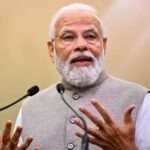The murder of the Khalistan leader Hardeep Singh Nijjar in Canada in June catapulted New Delhi into a full-blown diplomatic row with Ottawa in September. After Canadian Prime Minister Justin Trudeau linked India to the murder of Nijjar, Indo-Canadian relations plummeted to a new low. Nijjar was shot down by two masked men outside a gurdwara in British Columbia’s Surrey. The killers got away in a car driven by a third person. India has categorically denied any involvement and dismissed Trudeau’s charges as “absurd” and politically motivated.
The charges led Canada and then India to expel intelligence officers posted in each other’s country, prune the staff in their respective diplomatic missions, and suspend all bilateral engagements. India also suspended its visa service in Canada, a country it described as “a safe haven for terrorists”.
The allegations have raised “deep concerns” among some Western allies in the Anglosphere. Trudeau told the Canadian parliament that there were “credible allegations of potential links between agents of the government of India and the killing” of Nijjar. A report in The New York Times complicated the situation further when it quoted unnamed US officials as saying that the US had assisted Canada with intelligence that linked India to the murder as part of the “Five Eyes Alliance”, which is a broad intelligence-sharing arrangement among the US, Canada, the UK, Australia, and New Zealand.
Equally, however, the unfolding drama has put the US and its Western allies in a spot. In recent years, most of them have built strong ties with India that they do not want to jeopardise. India is pivotal to their strategy in the Indo-Pacific region as a counterbalance to China’s aggression in Asia. The US, in particular, finds itself in a bigger dilemma than the others. The US cannot brush aside Trudeau’s charges against India since Canada is a close strategic ally, but India is a strategic partner that is critical in the Indo-Pacific region where China’s growing assertiveness is a common concern for both the US and India.
US President Joe Biden has invested heavily in the relationship. In June, he played host to Prime Minister Narendra Modi when he came to the US on his first state visit. The two sides have also signed a range of agreements that have further widened cooperation and consolidated the growing partnership. To show India’s importance in his scheme of things, Biden made a special effort to reach New Delhi a day before the G20 summit in September only to attend a private dinner that Modi hosted for him.
In addition, even in the highly polarised political situation in the US, there is robust bipartisan support from both Democrats and Republicans for strong ties with India. With the Canada imbroglio, the Biden administration is busy grappling with a situation where it does not want to be seen compromising the US’ core principles, such as respect for the international rule of law and freedom of speech, but it is equally keen to find a pragmatic solution to the current crisis to ensure that it does not alienate India.
Jumping the gun?
The New York Times report suggested that in the aftermath of the killing, US intelligence agencies assisted Canada in its investigation, but what appears to be the “smoking gun”—the intercepted communications of Indian diplomats in Canada that indicate their involvement in the plot—was gathered by Canadian officials themselves, the report said.
informed Biden, who brought it up with Modi as well.
Trudeau’s subsequent demeanour at the summit was frosty. He stayed away from the President’s dinner and the launch of the Global Biofuel Alliance. An airplane snag forced him to extend his stay by two days, but he did not use the time to engage with the Indian government, nor did Delhi make efforts to reach out to him. Trudeau also refused the alternative aircraft India offered him.




